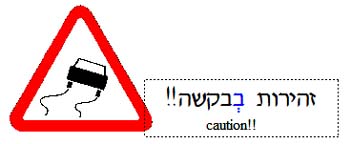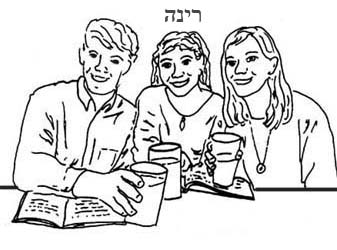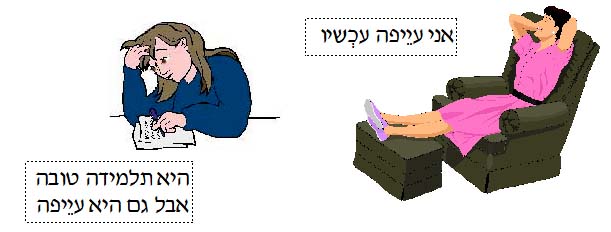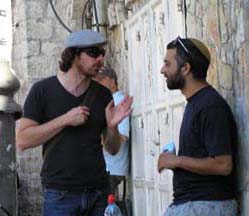100.00 %
![]() Use with Software Chapter 1:7 "Vocabulary Presentation"
Use with Software Chapter 1:7 "Vocabulary Presentation"
The verbs used below are infinitive forms as indicated by the
ל. The infinitive is often used when giving a "command". Infinitive forms will be discussed later: ¶3.21.Carry out these requests as your teacher makes them in random order.*
|
בְבקשה לִכְתוב "שלום" במחְבֶרֶת |
Please write "Hello" in the notebook |
|
בְבקשה לִכְתוב על הלוּחַ |
Please write on the chalkboard |
|
בְבקשה לִקְרוא |
Please read |
|
בְבקשה לִפְתוחַ את הסֵפֶר |
Please open your book |
|
בְבקשה לִפְתוחַ בְעמוּד עֶשֶׂר |
Please open to page ten |
|
בְבקשה לְדבֵּר עִבְרית |
Please speak Hebrew |
|
בְבקשה לְהִסְתכֵּל ימינה |
Please look to the right |
|
לְהִסְתכֵּל שׂמֹאלה |
Look to the left |
|
לְדבֵּר בְּקול רם |
Speak loudly |
|
לְדבֵּר מהֵר |
Speak quickly |
|
בְבקשה לְהקְשיב למורֶה / למורה |
Please listen to the teacher |
|
לֹא לְהקְשיב למורֶה / למורה |
Don't listen to the teacher |
|
בְבקשה לְדבֵּר לְאט |
Please speak slowly |
|
בְבקשה לִכְתוב אֶת המילה: תודה |
Please write the word |
תודה
Note: The 
זְהירות
אֵין
דגש
48
1.36 דוּ-שֹיחַ UNDERSTANDING A DIALOG
![]() Use with Software Chapter 1:10 "Hebrew
Personal Names"
Use with Software Chapter 1:10 "Hebrew
Personal Names"
Tamah3, a young American studying in Israel, meets two
Israelis. Listen to their conversation as read on the audio recording.
Then state the main ideas of the dialog in English. Do Not Translate.
100.00 %
רינה: דפְנה ! בּואי רֶגע. דפנה: רינה! שלום. רינה: דפְנה, מי זֶה שם? דפנה: זֶה דוד. הוּא תלְמיד בַּכּיתה, תלְמיד
מְצוּיין. רינה: הוּא אמֶריקאי? דפְנה: כֵּן. הוּא לֹא יודֵע עבְרית - רק
אנְגְלית. רינה: הֵי דוִד! כֵּן אתה... בּוֹא רֶגע... בּוקֶר
טוב, שְמי רינה
Tamah3: I'm sorry - I understand some
Hebrew.. But I don't speak very well.
רינה: יופי. אני לא יודעת אנְגְלית. בּוא נִלְמד
יחד. דפְנה: דוד, בְּבקשה לחזור
אחריי

דוד: בּוקר טוב.
דפנה: יופי ! מְצוּיין !
דוד: עכְשיו, לחְזור אחריי
- Good Morningרינה ודפנה:
Good Morningדוִד: טוב מְאוד
.... ? "Does that mean "very good49
1.36.1 הבנת הנִשְמע Gisting (Getting the main idea)
Here is an example of what might be your initial summary of this conversation.
'A conversation between two young women. It deals with an American student. Something about Hebrew and English. They call him over and greet him. He responds in English. They get him to say
בוקֶר טוב and praise him. He teaches them to say "Good Morning" in English. '



Listen to the dialog a second time, either with the teacher reading the dialogue, or listening to the audio recording. Answer these questions in Hebrew using the phrases in the dialogue.:
1. What are the names of the three persons in the scene?
2. Why didn't they know the young man previously?
3. What does Rina propose? Why?
4. What words or phrases express approval?
If you are listening to your teacher read the dialogue, call out
"רֶגע" when you think you have heard words that provide the answer you are seeking. Even if you already know the answer, you must still wait until the information-bearing words have been uttered in the performance of the dialog, before you call "רֶגע" (If you are using the audio recording, stop the machine.) Write the word or words on a sheet of paper. Then call out "לְהמְשִיך" to move on to the next question.50
1.36.2 חזרה Review
Read the dialogue aloud. Practice reading with apropriate expression. Let your "sentence-melody" (i.e. the expression that you put into your voice as you read) indicate that you understand what you are reading.
The speed is not important at this state.
Copy the dialog. Use a separate sheet of paper.
Write your name at the end.![]()
בְבקשה לִכְתוב בְעבְרית
1. Good morning ____________________________________________
2. Who is this? ____________________________________________
3. I am the teacher. ____________________________________________
4. He is a teacher . ____________________________________________
5. I am a student (m). ____________________________________________
6. He is a good student. ____________________________________________
7. Come here (f) a minute. ____________________________________________
8. What is your name (f)? ____________________________________________
9. Pleased to meet you . ____________________________________________
10. My name is Rina. ____________________________________________
11. Who are you ? ____________________________________________
12. She is here. ____________________________________________

51
1.37 תרְגיל כְתיבה WRITING PRACTICE
1.37.1 Dictation Practice. Take a sheet of paper and write what you hear
100.00 %
1.37.2 Copy these Hebrew phrases.
100.00 %
מי זֶה שם![]() Use with Software Chapter 3, Drill 5: "Typing Practice With the Hebrew
Keyboard"
Use with Software Chapter 3, Drill 5: "Typing Practice With the Hebrew
Keyboard"![]()
תלְמיד מְצוּיין
____________ An excellent studentאני לֹא יודעת
__________________ (I don't know (fעכְשיו
____________________ Nowבְבקשה לחזור אחריי
______________ Please repeat after me
בואי רֶגע__________
Come (f) [here for] a minute
Now, without
looking at the textbook write these sentences as you listen to the audio.
![]()

הוּא תלְמיד מְצוּיין
רינה יודעת עבְרית, ואני לא יודֵע עבְרית
בְבקשה לחזור אחריי עכְשיו
100.00 %
1.37.1
בְתחנת האוטובּוּס
100.00 %
1.37.2
שְאֵלות
1. סיגל אמֶריקאית?___________________
52
דן:
סְליחה, אתְ ישְרְאֵלית?

סיגל:
כן, אבל אתה לא ישְרְאֵלי.
דן:
נכון, אני מֵאמֶריקה.
סיגל:
איפה באמֶריקה?
דן:
אני מִמִנֶסוטה.
סיגל:
אתה סְטוּדֶנְט באוּניבֶרְסיטה?
דן:
כֵן, באוניבֶרְסיטה העִבְרית.
סיגל:
מה אתה לומֵד?
דן:
אני לומֵד היסְטורְיה שֶל העולם.
סיגל:
כן? גם אני לומֶדֶת היסְטורְיה. אבל היסְטורְיה שֶל הַיְהוּדים.
דן:
לא מְשנֶה . . . אוּליי נִלְמד יחד?
סיגל:
! הינֵה האוטובּוּס. קו שלוש. יאללה!
2. דן מִתֵל אביב? ______________________
3. אֵיפׂה דן לומֵד? _____________________
4. אֵיפׂה מינֶסוטה? ____________________
הֶעָרָה
Is the word בְבקשה spelled correctly?
Be sure to read the note on the left!